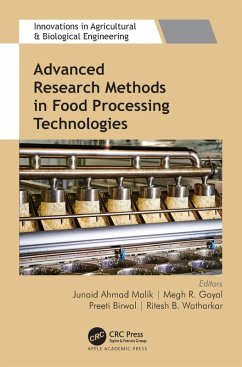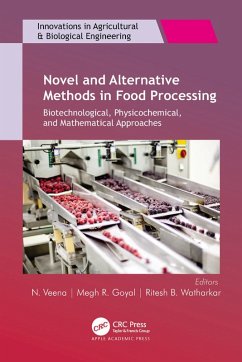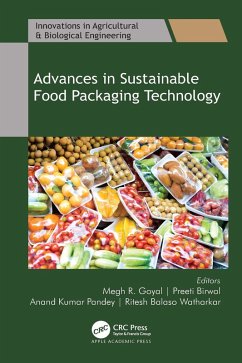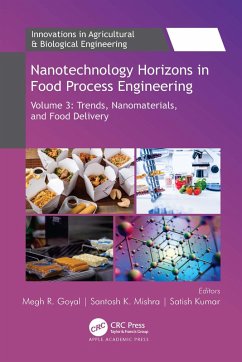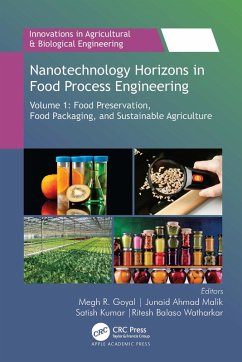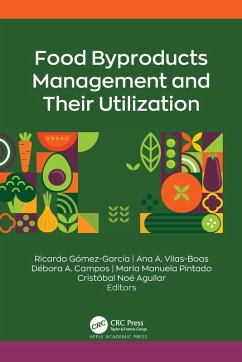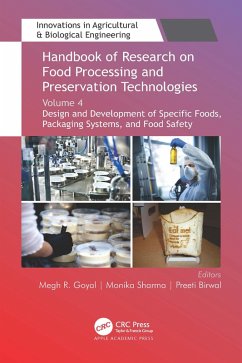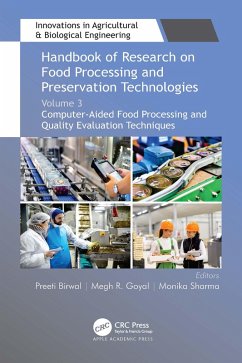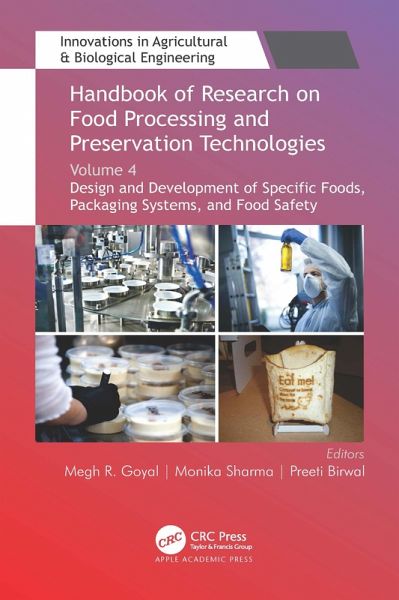
Handbook of Research on Food Processing and Preservation Technologies (eBook, ePUB)
Volume 4: Design and Development of Specific Foods, Packaging Systems, and Food Safety
Redaktion: Goyal, Megh R.; Birwal, Preeti; Sharma, Monika
Versandkostenfrei!
Sofort per Download lieferbar
138,95 €
inkl. MwSt.
Weitere Ausgaben:

PAYBACK Punkte
69 °P sammeln!
The Handbook of Research on Food Processing and Preservation Technologies is a valuable 5-volume collection that illustrates various design, development, and applications of novel and innovative strategies for food processing and preservation. The roles and applications of minimal processing techniques (such as ozone treatment, vacuum drying, osmotic dehydration, dense phase carbon dioxide treatment, pulsed electric field, and high-pressure assisted freezing) are discussed, along with a wide range of applications. The handbook also explores some exciting computer-aided techniques emerging in t...
The Handbook of Research on Food Processing and Preservation Technologies is a valuable 5-volume collection that illustrates various design, development, and applications of novel and innovative strategies for food processing and preservation. The roles and applications of minimal processing techniques (such as ozone treatment, vacuum drying, osmotic dehydration, dense phase carbon dioxide treatment, pulsed electric field, and high-pressure assisted freezing) are discussed, along with a wide range of applications. The handbook also explores some exciting computer-aided techniques emerging in the food processing sector, such as robotics, radio frequency identification (RFID), three-dimensional food printing, artificial intelligence, etc. Some emphasis has also been given on nondestructive quality evaluation techniques (such as image processing, terahertz spectroscopy imaging technique, near infrared, Fourier transform infrared spectroscopy technique, etc.) for food quality and safety evaluation. The significant roles of food properties in the design of specific foods and edible films have been elucidated as well.
Volume 4: Design and Development of Specific Foods, Packaging Systems, and Food Safety presents new research on health food formulation, advanced packaging systems, and toxicological studies for food safety. This volume covers in detail the design of functional foods for beneficial gut microflora, design of specific foods for gut microbiota, composite probiotic dairy products: concepts and design with a focus on millets, encapsulation technology for development of specific foods, prospects of edible and alternative food packaging technologies, recent advancements in edible and biodegradable materials for food packaging, potential of ozonation in surface modification of food packaging polymers, characterization applications and safety aspects of nanomaterials used in food and dairy industry, toxic effects of tinplate corrosion, and mitigation measures in canned foods.
Other volumes in the set include:
Volume 1: Nonthermal and Innovative Food Processing Methods
Volume 2: Nonthermal Food Preservation and Novel Processing Strategies
Volume 3: Computer-Aided Food Processing and Quality Evaluation Techniques
Volume 5: Emerging Techniques for Food Processing, Quality, and Safety Assurance
The book helps to provide an understanding of different food formulations and development of edible packaging techniques with emphasis on the assessment of food product safety and quality. The book also provides information on various methods of formulation for development of new and safe products. Together with the other volumes in the set, Handbook of Research on Food Processing and Preservation Technologies will be a valuable resource for researchers, scientists, students, growers, traders, processors, industries, and others.
Volume 4: Design and Development of Specific Foods, Packaging Systems, and Food Safety presents new research on health food formulation, advanced packaging systems, and toxicological studies for food safety. This volume covers in detail the design of functional foods for beneficial gut microflora, design of specific foods for gut microbiota, composite probiotic dairy products: concepts and design with a focus on millets, encapsulation technology for development of specific foods, prospects of edible and alternative food packaging technologies, recent advancements in edible and biodegradable materials for food packaging, potential of ozonation in surface modification of food packaging polymers, characterization applications and safety aspects of nanomaterials used in food and dairy industry, toxic effects of tinplate corrosion, and mitigation measures in canned foods.
Other volumes in the set include:
Volume 1: Nonthermal and Innovative Food Processing Methods
Volume 2: Nonthermal Food Preservation and Novel Processing Strategies
Volume 3: Computer-Aided Food Processing and Quality Evaluation Techniques
Volume 5: Emerging Techniques for Food Processing, Quality, and Safety Assurance
The book helps to provide an understanding of different food formulations and development of edible packaging techniques with emphasis on the assessment of food product safety and quality. The book also provides information on various methods of formulation for development of new and safe products. Together with the other volumes in the set, Handbook of Research on Food Processing and Preservation Technologies will be a valuable resource for researchers, scientists, students, growers, traders, processors, industries, and others.
Dieser Download kann aus rechtlichen Gründen nur mit Rechnungsadresse in A, B, BG, CY, CZ, D, DK, EW, E, FIN, F, GR, HR, H, IRL, I, LT, L, LR, M, NL, PL, P, R, S, SLO, SK ausgeliefert werden.





